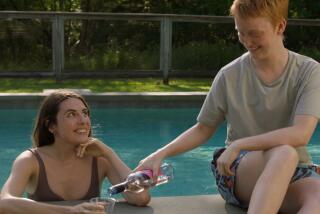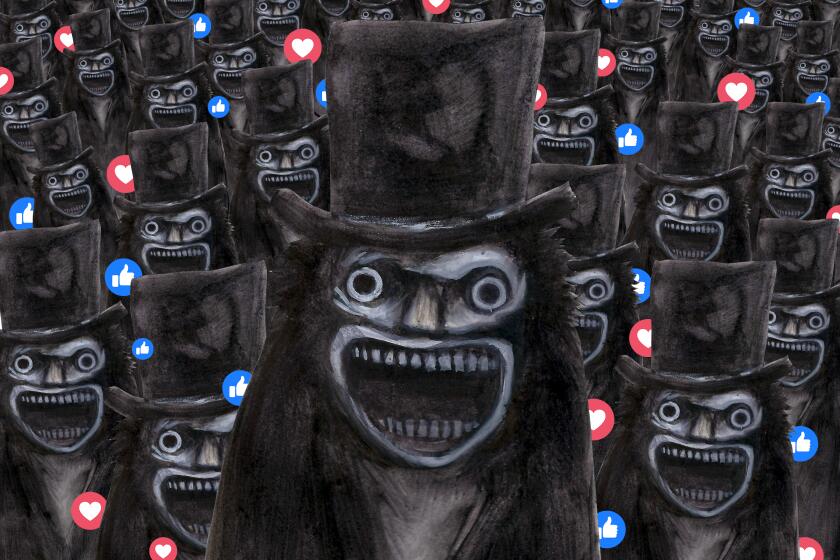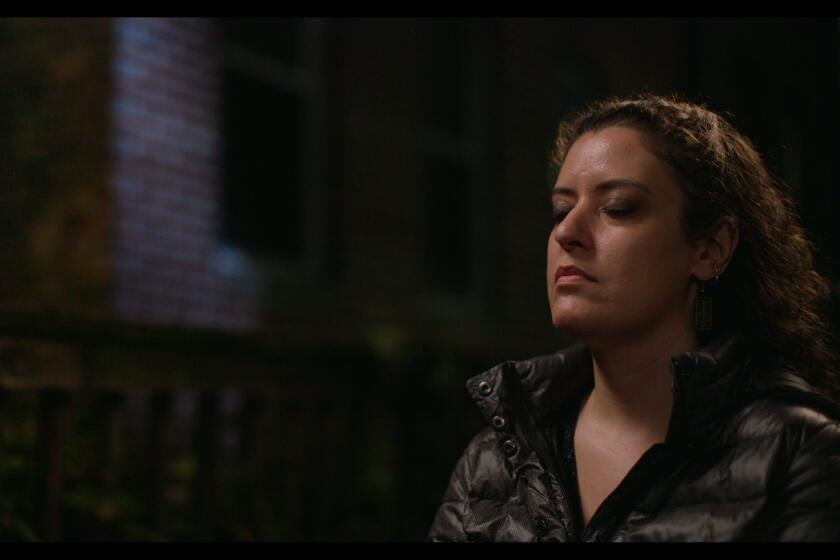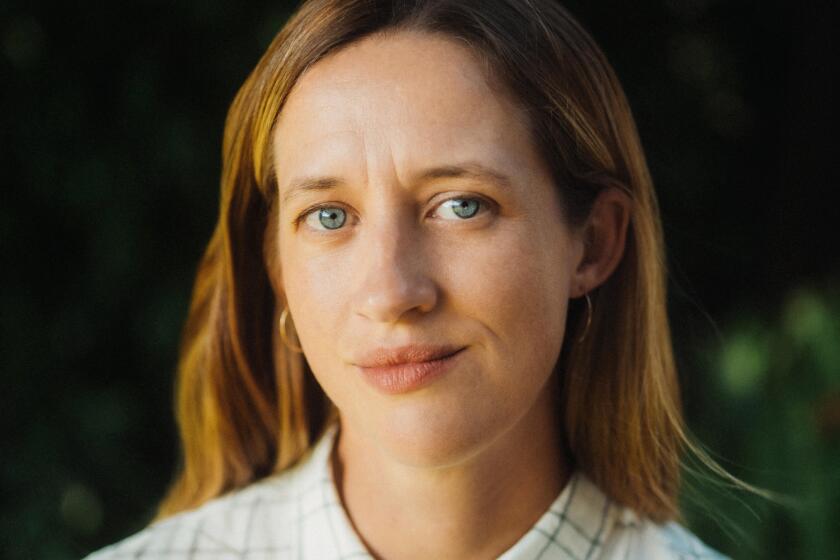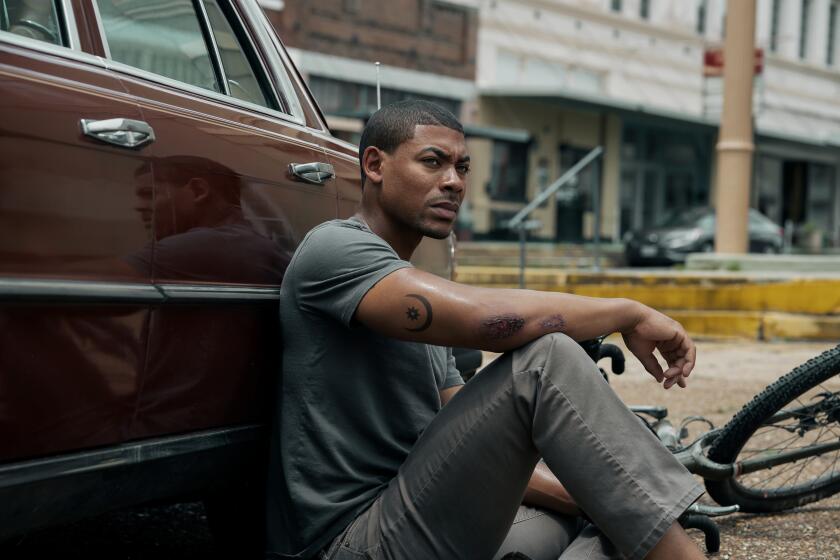‘Before Midnight’ strikes new path in couple’s journey
NEW YORK — “Before Midnight,” Richard Linklater’s third film about the relationship between an American man (Ethan Hawke) and French woman (Julie Delpy), closes with what might be the series’ piece de resistance: a 30-minute hotel-room argument between the couple. Brutal and witty, the power dynamic shifts back and forth between the pair, as one grabs the upper hand and the other snatches it back.
The scene is so credible that at least one woman who’d seen the movie walked up to Linklater recently and told him she had begun to use some of the lines when she came to a disagreement with her husband.
“Great,” Linklater said drolly. “We’re helping America argue.”
VIDEO: Sundance 2103 Video guide
Americans may be back to arguing about, or at least discussing, Linklater’s trilogy — “Before Sunrise,” “Before Sunset” and now “Before Midnight” — when the new film arrives in theaters May 24. “Before Midnight’s” interest in the struggles of an everyday couple and universal subjects such as relationships, death, parenthood and career (“a kind of anti-drama,” Hawke said) would feel authentic in any moviegoing season. But against the summer backdrop of Iron Men and Starfleet commanders, “Before Midnight” may pack an even stronger emotional punch.
When the film premiered at the Sundance Film Festival in January, critics praised the film’s portrait of a complicated relationship that is passionate, thoughtful, chatty and spiky.
“Before Midnight” catches up with Jesse and Celine after they’ve spent years together (and accumulated all the shared baggage that comes with such a commitment), so the film serves as a kind of time-lapse mirror. The first two movies tracked the pair from their callow 20s to their more enlightened 30s. “Midnight” reveals the stubbornness and insight that one’s 40s can bring.
“We make these movies because of where we are in our own lives and what’s changed since we made the last film,” Linklater said as he dined with Hawke, 42, and Delpy, 43, at a Greek restaurant a few weeks ago. “But we hope part of the appeal is that people see their own lives in it too.”
Going for three
A few years ago, Linklater, Delpy and Hawke didn’t talk about a third film as more than jokey speculation, if that.
After all, it had been the better part of two decades since starry-eyed Celine had met the cynical Jesse on a train in “Before Sunrise,” the early twentysomethings spending a night in Vienna walking and talking, then going their separate ways.
“Before Sunrise” wasn’t a huge hit — in today’s dollars it would have made only $8 million at the box office. But it resonated strongly with many who were in their late teens or 20s. That demographic was facing many of the questions Celine and Jesse were hashing out, and, like a previous generation that identified with films like “Easy Rider” and “Alice’s Restaurant,” “Before Sunrise” offered a big-screen reflection of their own small concerns. There was a wish-fulfillment aspect too: If you were riding a train in Europe during a transitional summer, wouldn’t it be nice if that cute blonde across the aisle spontaneously decided to disembark and spend the day with you?
The strong Generation X identification, however, surprised Linklater, who said he aimed to make “Sunrise” a universal movie, scrubbing it of pop culture references. When journalists asked him what it was like to make a movie that represented a generation, the normally easygoing director would retort, “Um, did you watch the movie?”
PHOTOS: Cannes Film Festival scene
Despite the fan base for “Before Sunrise,” there was hardly a clamor for a sequel — Linklater jokes that the only people who wanted it were him, Hawke and Delpy. Yet they felt there was a new chapter to be told in what became “Before Sunset.” Linklater, Hawke and Delpy wrote the sequel together (the first film was written by Linklater and Kim Krizan) and had Jesse and Celine run into each other in Paris and spend another day together.
In “Before Sunset,” Celine and Jesse are in their early 30s, and the characters’ lives were beginning to parallel the actors’ own — like Hawke, Jesse had published a novel, fathered a son with another woman and was living in New York. Discussions about the precipice between youth and middle age filled the air. The movie wound up garnering an Oscar nomination in 2005 for original screenplay.
Though “Before Sunset” ended with a cliffhanger (Jesse skips his return flight to stay with Celine), for many years the actors had little interest in revisiting Celine and Jesse.
But in 2011, Delpy, who lives in Los Angeles, was on the East Coast shooting “2 Days in New York” near Hawke’s Manhattan apartment. They decided to get together — and invited Linklater to fly in from his home in Austin, Texas, to join the reunion. As they sat one afternoon in Hawke’s home, discussions grew more serious: What if, shortly after the finale of “Before Sunset,” Celine and Jesse had actually gotten together and remained together since? And what if they made a movie about it?
It would be the rarest of things — a ruminative indie romance threequel — and allow filmgoers to peek in on Jesse and Celine as a live-in couple, which hadn’t happened before.
“It was one of those situations where for many years we didn’t think we had much more to say,” Hawke said. “Then all of a sudden we kind of looked at each other and said, ‘Let’s find out if there’s something here.’”
In the years after they got together for “Before Sunrise,” Hawke, Delpy and Linklater all developed textured careers. Hawke became a hyphenate writing books and starring in and directing plays as well as appearing in a range of commercial and indie films including, in recent years, gritty crime pictures such as “Brooklyn’s Finest” and “Before the Devil Knows You’re Dead.” Delpy has been less visible in America, though she gained a following after her own two American-French romances, “2 Days in Paris” and its 2012 sequel, “2 Days in New York,” which she directed and starred in. She’s also had indie film roles on both sides of the Atlantic and released a folk-pop album. And Linklater had returned to indie fare such as “Bernie” after more mainstream films such as “School of Rock” and “The Bad News Bears” in the 2000s.
But the “Before” series has a way of bringing each of them back. In the year after the meeting at Hawke’s apartment, when two of the three were in the same city, the third would hop a flight, and the trio would toss around ideas. They imagined a new film would follow the basic template of the first two — a dialogue-heavy piece centered on Celine and Jesse over the course of a single day in Europe. By spring 2012, they had decided to make a movie and were hammering out a script in a hotel in Greece near potential locations.
Catching up
With the suspense left at the end of “Before Sunset,” the three had to decide where to pick up in the third installment. As “Midnight” begins, answers quickly come.
Jesse is in a Greek airport saying goodbye to his now-teenage son. He then gets into a car in which Celine is waiting. In the back seat are twin 8-year-old girls. Jesse and Celine, it turns out, became a couple after their last rendezvous and quickly conceived. They have never married but have been living together in Paris ever since. They are now concluding a summer vacation on a Greek island with their daughters and Jesse’s son.
The movie tracks the pair across a set of distinct, extended scenes — there’s a 14-minute single-take shot in the car; a dinner with couples young and old at a Greek retreat; and a walking-and-talking excursion through the unnamed island that calls back to the first two films. And then there’s the epic hotel fight. Talking exuberantly over one another, as they tend to do, Linklater, Delpy and Hawke tried to describe it.
“The pace is crucial,” Linklater said. “It all built to that fight,” Hawke added. “It’s an arc,” Delpy suggested.
“There are movie fights, and then there are how fights really unfold,” interjected Linklater. “In real life the fight often starts long before the actual fight.”
Hawke: “And you’re always trying to end the fight.”
Delpy: “People drop little things.”
Linklater: “Like, ‘You’re right.’ ‘As always.’”
Hawke: “And it’s the ‘As always.’”
Despite their history together, Linklater, Delpy and Hawke knew that it would take time to create the authenticity they sought for “Before Midnight.” Ideas would surface and go nowhere (an alternate version had the film following Jesse and Celine separately as they went about their everyday Paris routines, then coming together for 15 minutes at the end of the film). So they let things gestate.
Months of writing gave way to weeks of rehearsal; scenes were changed, chiseled, then changed again. While many actors dismiss the idea that their roles have much to do with their actual lives, when these actors wrote, they would share personal stories and see if they could channel them into the film. Delpy’s childhood memory of her father euthanizing the family cat, aimlessly recounted to Hawke, ended up on the screen. So did experiences that Delpy and Hawke, both parents, had with their significant others involving their children (neither had kids when the first movie was made).
One of the movie’s signature lines — “You’re the mayor of Crazytown,” Jesse tells Celine, with an added expletive — was contributed by Hawke. He hints that it was inspired by something he said to ex-wife Uma Thurman, with whom he had a tabloid divorce.
Once the lines were set, they embarked on careful, demanding rehearsals.
“People are disappointed when they hear nothing is improvised,” Linklater said.
“They want to believe you can just sit down and play Chopin,” Hawke agreed.
“It really does have to feel natural,” said Delpy. “If you mess up one scene that’s it.”
“If the camera catches you acting, the whole spell breaks,” Hawke added. “After doing this, most movies are like a vacation.”
Striking a balance
Experience is a funny thing, especially if you’re using it to tell a story. Not enough of it and your creation will feel thin; too much and it can weigh down your tale with nostalgia. Linklater, who at 52 is a full decade older than the “Before” characters he created, said he feels he has struck the right balance in “Midnight.”
“I think this movie is deeper and more interesting because most of us would like to think we’re deeper and more interesting when we get older,” he said. “We basically thought of it this way: ‘If I could go back to my 23-year-old self and sign up for then what I have now, would I? And for these characters the answer is, ‘Of course.’ They’ve gotten, to a very high degree, what they want. And yet they’re still two human beings. And no matter what two human beings achieve, there’s a price to be extracted.”
What the movie has to say about relationships can’t be reduced to a simple message, except maybe that they’re messy, beautiful and crazy-making. There are symbols and themes in the film, but no easy answers. Does a poignant scene of Jesse and Celine watching a setting sun, for instance, represent possibility or mortality? Linklater said he left it deliberately ambiguous and has found elements like that to be a Rorschach test for those who watch them.
While Linklater may not have intended “Midnight” to be a generational totem, given that it’s about members of the first generation whose parents endured widespread divorce on the one hand and the possibilities afforded by sustained prosperity and increased mobility on the other, it winds up feeling that way just the same. Jesse and Celine are animated by the sense of a greater romantic possibility. But they are also clear-eyed about the tenuousness of it all, and it’s the suspension between the two that makes their relationship so compelling and current.
“I think of Jesse and Celine as two separate beings who come alive in us. They go dormant for five or six years, and then they stick their heads out and go, ‘Well, maybe I have something to say about who we are and the world around us,” Linklater said. “They’ll probably still be doing that when they’re old enough for the senior center. Though I don’t know if we’ll be making a movie about them there.”
More to Read
Only good movies
Get the Indie Focus newsletter, Mark Olsen's weekly guide to the world of cinema.
You may occasionally receive promotional content from the Los Angeles Times.


